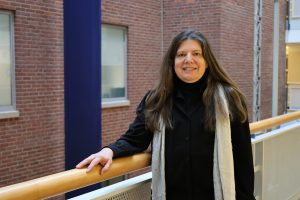Mental health conversations were virtually nonexistent for many in Generation X and the Baby Boom generation. Today, however, policies, non-governmental organizations, and advocacy efforts have shifted mental health from a taboo topic to an open and ongoing dialogue. This progress has been instrumental in reducing stigma and promoting awareness about mental health challenges.
One key initiative in this effort is the Mental Health First Aid Training, offered by the National Council for Mental Wellbeing. The program equips participants to assist individuals experiencing a mental health or substance use challenge, much like traditional first aid prepares someone to respond to a physical health emergency.

Maryann Fusco-Rollins, an assistant extension educator with UConn Extension in Tolland County, brings this transformative training to adults through the UConn 4-H program. Supported by the College of Agriculture, Health and Natural Resources (CAHNR) Strategic Vision Implementation grant, her mission is both professional and deeply personal.
Growing up in the 1980s, Fusco-Rollins witnessed a family member struggle with mental health challenges. “There wasn’t as much information available then as there is now, but I was already seeking services and connecting people to get help,” she recalls. This early exposure to mental health advocacy left a lasting impression, inspiring her to pursue work in this field.
After serving in the Peace Corps in Guatemala, Fusco-Rollins took a job at a crisis hotline, balancing patient intakes by day and hotline calls by night.
“I took as many professional training and certification classes as I could,” she says. Her drive to learn and help others led to a role as a Dialectical Behavior Therapy (DBT) skills trainer, working with individuals diagnosed with borderline personality disorder. She also served as an on-site supervisor at a residential program supporting individuals with schizophrenia.
“The DBT skills training opened my eyes to the importance of mental wellness practice for everyone,” Fusco-Rollins shares. “What resonated most with me was the comprehensive nature of DBT. It’s not just about helping the client—it’s about equipping the entire care team with mindfulness tools. It’s like putting your own oxygen mask on first.”
Fusco-Rollins emphasizes that mental health is about recognizing challenges and taking action when needed. “It’s about getting to know yourself and being honest about when you’re not okay,” she says. Yet, she acknowledges, asking for help can be one of the hardest steps.
The Mental Health First Aid Training she now teaches is designed to address this hesitation. Participants learn to support someone in crisis or non-crisis situations until professional help is available. The course provides practical, real-world skills, including how to listen non-judgmentally and connect individuals to appropriate resources. Pre-work ensures participants are prepared, while follow-up materials offer continued support.
“This training is for everyone—whether you have experience or not,” Fusco-Rollins explains. “Like traditional first aid, it doesn’t teach you to diagnose or treat conditions. Instead, it empowers you to act as a bridge, offering crucial assistance during a mental health crisis or emerging concern.”
Just as wearing a seatbelt or eating healthfully supports physical well-being, prioritizing mental health is essential for overall health.
Amy Harder, Ph.D., associate dean for extension, is excited to see UConn Extension increasing its efforts in this area.
“Addressing mental health was reported as a leading priority when we surveyed Connecticut residents last year about their needs, and it’s important that we work on topics that are meaningful to local communities,” shares Harder.
Participants in the training also learn to care for themselves. The course emphasizes the importance of self-care routines to manage stress and maintain long-term wellness. “The MHFA course trains people to help others in a supportive, non-judgmental way,” says Fusco-Rollins. “By the end, participants feel confident they can help someone in a concerning situation or crisis. They know how to access additional resources, and they leave with a sense of hope. We are not struggling alone—there are people who can help, recovery is possible, and there is hope.”
This work is supported by CAHNR’s Health and Wellbeing Strategic Vision Implementation Committee.



